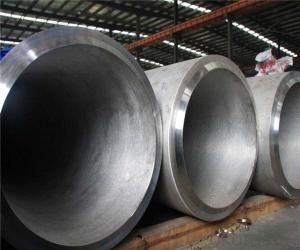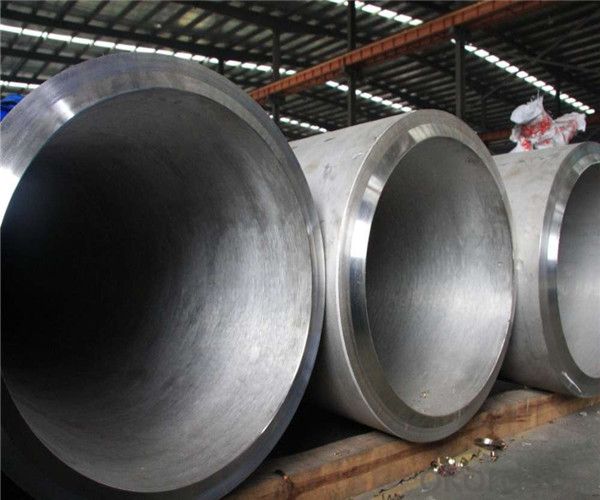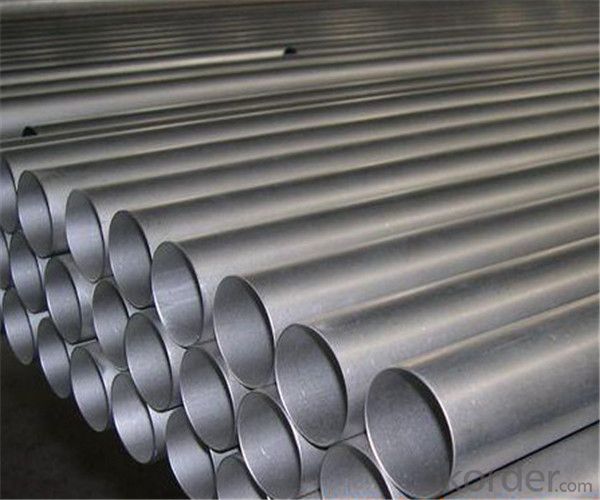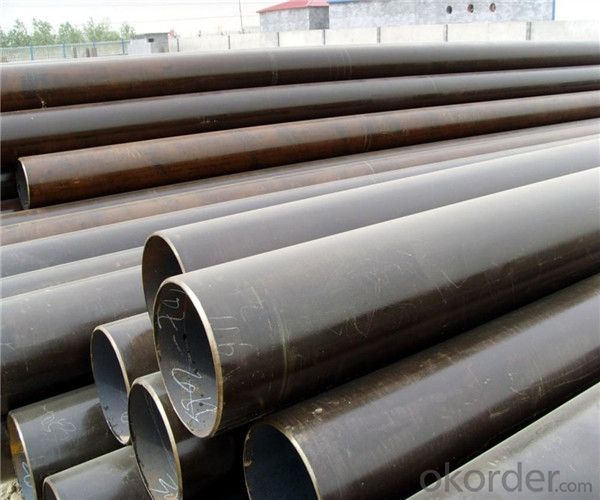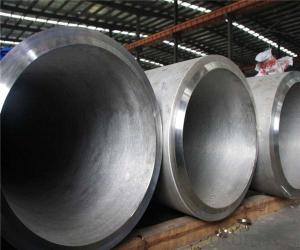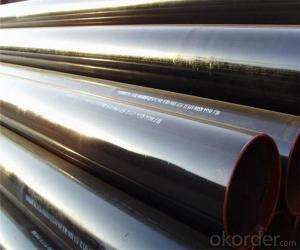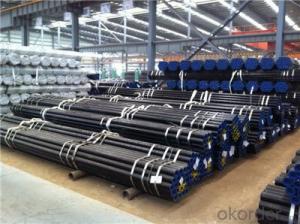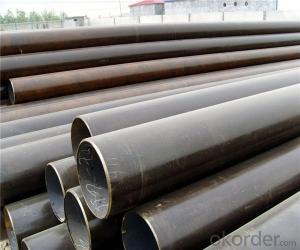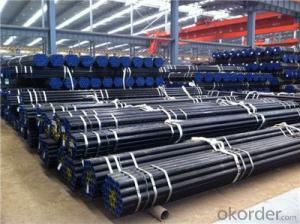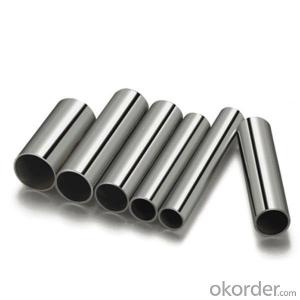High Quality Seamless Steel Pipe with Low Price from CNBM International Group
- Loading Port:
- Tianjin
- Payment Terms:
- TT OR LC
- Min Order Qty:
- 150 m.t.
- Supply Capability:
- 200000 m.t./month
OKorder Service Pledge
OKorder Financial Service
You Might Also Like
PRODUCT DETAILS
1.Structure of Seamless Steel Pipe Description:
A large amount of Seamless Steel Pipes is offered to the clients at cost effective rates. These pipes are extremely durable, resistant to corrosion and have high tensile strength. Our pipes are used in nuclear plants, power plants, refineries and construction industry across the country. Furthermore, we are capable of providing these seamless pipes to the clients in bulk quantity.
2.Main Features of the Steel Pipe:
• High manufacturing accuracy
• High strength
• Small inertia resistance
• Strong heat dissipation ability
• Good visual effect
•Reasonable price
3.Packaging & Delivery:
| Packaging Details: | Seaworthy packages, bundles wrapped with strong steel strip |
| Delivery Detail: | 15-30 days after received 30% TT |
4.Seamless Steel Pipe Specification:
| Standard: | GB, DIN, ASTM,ASME, ASTM A106-2006, ASTM A53-2007 |
| Grade: | 10#,20#, 45#, 16Mn |
Thickness: | 8 - 33 mm |
| Section Shape: | Round |
| Outer Diameter: | 133 - 219 mm |
| Place of Origin: | Shandong, China (Mainland) |
| Secondary Or Not: | Non-secondary |
| Application: | Hydraulic Pipe |
| Technique: | Cold Drawn |
| Certification: | API |
| Surface Treatment: | factory state or painted black |
| Special Pipe: | API Pipe |
| Alloy Or Not: | Non-alloy |
| Length: | 5-12M |
| Outer Diameter: | 21.3-610mm |
5.Product pictures
GALVANIZIED PIPE
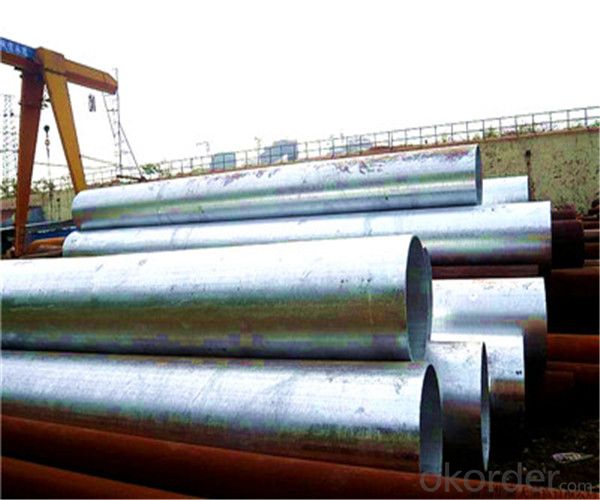
PAINTING PIPE
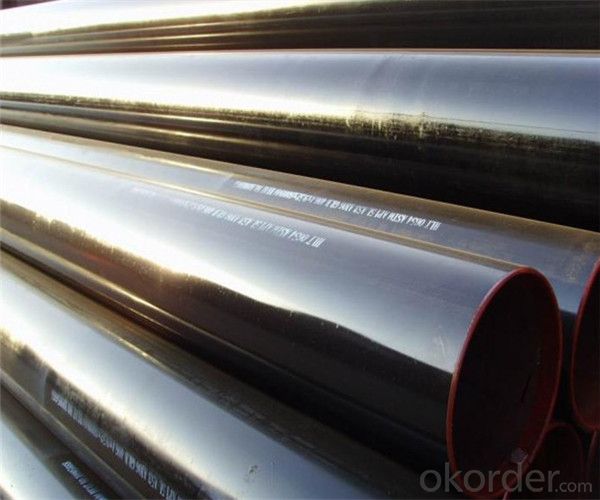
6.FAQ of Seamless steel pipe:
①How is the quality of your products?
Our products are manufactured strictly according to national and internaional standard, and we take a test
on every pipe before delivered out. If you want see our quality certifications and all kinds of testing report, please just ask us for it.
Guaranteed: If products’ quality don’t accord to discription as we give or the promise before you place order, we promise 100% refund.
②How about price?
Yes, we are factory and be able to give you lowest price below market one, and we have a policy that “ for saving time and absolutely honest business attitude, we quote as lowest as possible for any customer, and discount can be given according to quantity”,if you like bargain and factory price is not low enough as you think, just don’t waste your time.Please trust the quotation we would give you, it is professional one.
③Why should you chose us?
Chose happens because of quality, then price, We can give you both.Additionally, we can also offer professional products inquiry, products knowledge train(for agents), smooth goods delivery, exellent customer solution proposals.Our service formula: good quality+good price+good service=customer’s trust.
SGS test is available, customer inspection before shipping is welcome, third party inspection is no problem.
- Q: What are the different types of steel pipe fittings for industrial applications?
- There are several types of steel pipe fittings commonly used in industrial applications, including elbows, tees, reducers, couplings, unions, flanges, and caps. These fittings are designed to connect, redirect, or control the flow of fluids in a piping system, ensuring efficient and reliable operation in various industrial processes.
- Q: What are the different methods of repairing steel pipes?
- There are several methods for repairing steel pipes, including welding, pipe wrapping, pipe lining, and pipe bursting. Welding involves fusing the damaged sections of the pipe using heat and pressure. Pipe wrapping involves using a fiberglass or epoxy resin wrap to reinforce and seal the damaged areas. Pipe lining involves inserting a new pipe into the damaged one, creating a seamless and corrosion-resistant inner lining. Pipe bursting involves replacing the damaged pipe by using a bursting head to break it apart while simultaneously pulling a new pipe into place. The choice of method depends on the nature and extent of the damage, as well as other factors such as cost and accessibility.
- Q: How do you prevent steel pipes from rusting?
- To prevent steel pipes from rusting, various measures can be taken. One effective method is to apply a protective coating on the surface of the pipes. This can be done using different types of coatings such as paint, epoxy, or zinc. These coatings act as a barrier between the steel and the corrosive environment, preventing moisture and oxygen from coming into direct contact with the metal and causing rust. Another approach is to use corrosion inhibitors. These substances are added to the water or fluid flowing through the pipes to create a protective film on the steel's surface. This film acts as a shield, inhibiting the corrosion process and preventing rust formation. Regular maintenance is crucial in preventing rust on steel pipes. This includes inspecting the pipes for any signs of damage or corrosion and promptly repairing or replacing any compromised areas. Additionally, keeping the pipes clean and dry by removing any accumulated dirt or moisture helps to prevent rust formation. In some cases, it may be beneficial to use stainless steel pipes instead of regular steel. Stainless steel contains chromium, which forms a passive oxide layer on the surface of the metal. This layer acts as a natural barrier against corrosion, making stainless steel pipes highly resistant to rust. Lastly, controlling the environment in which the pipes are installed can also help prevent rust. This can be achieved by maintaining proper ventilation, controlling humidity levels, and avoiding exposure to harsh chemicals or corrosive substances. By implementing these preventive measures, the lifespan and integrity of steel pipes can be significantly extended while minimizing the risk of rust formation.
- Q: Can steel pipes be used for oil and gas well production?
- Yes, steel pipes can be used for oil and gas well production. Steel pipes are commonly used in the oil and gas industry due to their high strength and durability, which allows them to withstand the harsh conditions of drilling and production processes. Additionally, steel pipes can efficiently transport oil and gas over long distances, making them a preferred choice in the industry.
- Q: What is the difference between steel pipes and PEX pipes?
- The main difference between steel pipes and PEX pipes lies in their material composition. Steel pipes are made of rigid metal and are typically used for industrial applications, while PEX pipes are made of flexible plastic and are commonly used for residential plumbing systems. Steel pipes offer durability and strength, but can be prone to corrosion. PEX pipes, on the other hand, are corrosion-resistant and easier to install due to their flexibility. Additionally, PEX pipes have better insulation properties and are less likely to burst in freezing temperatures compared to steel pipes.
- Q: Can steel pipes be used for heating and cooling systems?
- Yes, steel pipes can be used for heating and cooling systems. Steel pipes are commonly used in HVAC (heating, ventilation, and air conditioning) systems due to their durability, strength, and resistance to high temperatures. They are especially suitable for transporting hot water or steam for heating purposes and can also handle the circulation of chilled water for cooling systems.
- Q: What are the different types of pipe connections used with steel pipes?
- Steel pipes are commonly connected using various types of pipe connections. The most frequently used connections are as follows: 1. Threaded connections: These connections involve screwing the ends of the pipe and using fittings with threads to connect them. They are typically used for smaller pipes and are easy to install and remove. 2. Welded connections: Welding is a popular method for joining steel pipes. This involves melting the metal and fusing the ends of the pipes together. Welded connections are strong and durable, making them suitable for high-pressure applications. 3. Flanged connections: Flanges are used to connect pipes by bolting them together. These connections are commonly used in industrial settings and are preferred for larger pipes or when easy disassembly is required for maintenance. 4. Grooved connections: Grooved fittings with internal grooves are used to connect pipes. These connections are commonly found in fire protection systems and are quick and straightforward to install. 5. Compression connections: Compression fittings are used to connect steel pipes by compressing a ferrule onto the pipe. This type of connection is frequently used in plumbing and provides a secure and tight seal. 6. Mechanical connections: Mechanical connections, such as couplings or clamps, allow for pipe connection without welding or threading. These connections are often used for temporary or emergency repairs. Each type of pipe connection has its own advantages and disadvantages. The choice of connection method depends on factors such as the application, pipe size, and installation requirements. It is crucial to carefully consider these factors to ensure a reliable and secure connection for steel pipes.
- Q: Can steel pipes be used for wastewater treatment?
- Yes, steel pipes can be used for wastewater treatment. Steel pipes are commonly used in the construction of wastewater treatment plants and systems due to their durability, strength, and resistance to corrosion. They are especially suitable for transporting and distributing wastewater, as they can withstand high pressure and temperature variations. Steel pipes can also be coated or lined with materials that provide additional protection against corrosion and chemical reactions with the wastewater. However, it is important to ensure that the steel pipes are properly maintained, inspected, and replaced when necessary to prevent any potential leaks or failures that could compromise the wastewater treatment process.
- Q: Can steel pipes be used for hydropower generation?
- Indeed, the utilization of steel pipes is possible for the generation of hydropower. Within hydropower systems, steel pipes find widespread application in various contexts like penstocks and pipelines. Penstocks, characterized by their large size, are responsible for transporting water from a reservoir to a turbine, facilitating the conversion of the water's kinetic energy into rotational energy. Consequently, these pipes necessitate robustness and longevity to endure the immense water pressure and structural weight. Furthermore, steel pipes are also employed for pipelines, facilitating the transportation of water from the turbine back to the river or reservoir. Ultimately, steel pipes are an indispensable element in the generation of hydropower, as they possess the necessary strength, durability, and resilience to withstand the challenging conditions associated with water flow.
- Q: How are steel pipes used in the construction of underground parking garages?
- Steel pipes are used in the construction of underground parking garages for various purposes, including providing structural support, serving as conduits for utilities such as water and electricity, and facilitating drainage systems. They are often used as deep foundation elements to support the weight of the structure and the vehicles above. Additionally, steel pipes are commonly used for installing fire suppression systems, ventilation systems, and plumbing connections within the parking garage.
Send your message to us
High Quality Seamless Steel Pipe with Low Price from CNBM International Group
- Loading Port:
- Tianjin
- Payment Terms:
- TT OR LC
- Min Order Qty:
- 150 m.t.
- Supply Capability:
- 200000 m.t./month
OKorder Service Pledge
OKorder Financial Service
Similar products
Hot products
Hot Searches
Related keywords
